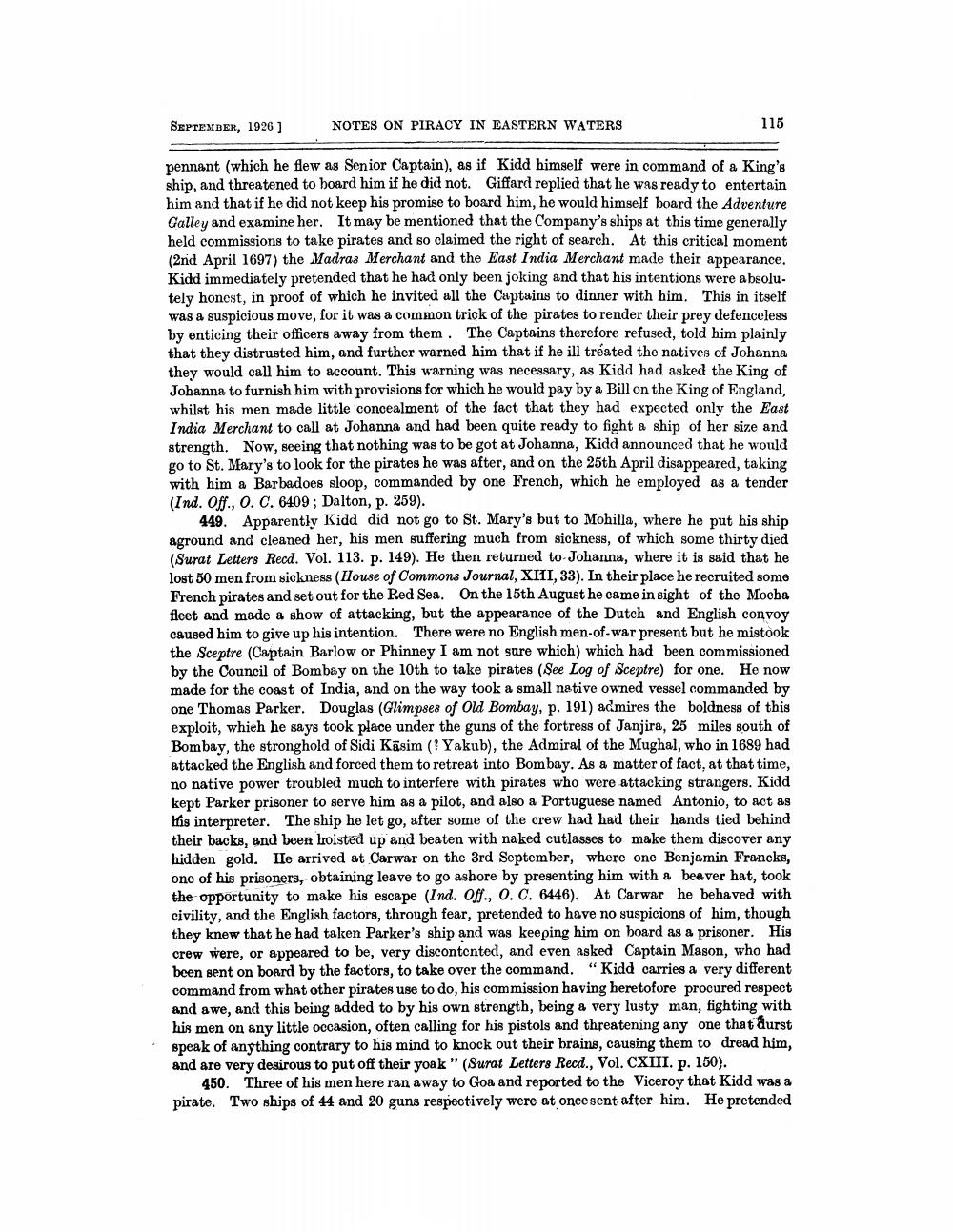________________
NOTES ON PIRACY IN EASTERN WATERS
115
SEPTEMBER, 1926]
pennant (which he flew as Senior Captain), as if Kidd himself were in command of a King's ship, and threatened to board him if he did not. Giffard replied that he was ready to entertain him and that if he did not keep his promise to board him, he would himself board the Adventure Galley and examine her. It may be mentioned that the Company's ships at this time generally held commissions to take pirates and so claimed the right of search. At this critical moment (2nd April 1697) the Madras Merchant and the East India Merchant made their appearance. Kidd immediately pretended that he had only been joking and that his intentions were absolutely honest, in proof of which he invited all the Captains to dinner with him. This in itself was a suspicious move, for it was a common trick of the pirates to render their prey defenceless by enticing their officers away from them. The Captains therefore refused, told him plainly that they distrusted him, and further warned him that if he ill treated the natives of Johanna they would call him to account. This warning was necessary, as Kidd had asked the King of Johanna to furnish him with provisions for which he would pay by a Bill on the King of England, whilst his men made little concealment of the fact that they had expected only the East India Merchant to call at Johanna and had been quite ready to fight a ship of her size and strength. Now, seeing that nothing was to be got at Johanna, Kidd announced that he would go to St. Mary's to look for the pirates he was after, and on the 25th April disappeared, taking with him a Barbadoes sloop, commanded by one French, which he employed as a tender (Ind. Off., O. C. 6409; Dalton, p. 259).
449. Apparently Kidd did not go to St. Mary's but to Mohilla, where he put his ship aground and cleaned her, his men suffering much from sickness, of which some thirty died (Surat Letters Recd. Vol. 113. p. 149). He then returned to Johanna, where it is said that he lost 50 men from sickness (House of Commons Journal, XIII, 33). In their place he recruited some French pirates and set out for the Red Sea. On the 15th August he came in sight of the Mocha fleet and made a show of attacking, but the appearance of the Dutch and English convoy caused him to give up his intention. There were no English men-of-war present but he mistook the Sceptre (Captain Barlow or Phinney I am not sure which) which had been commissioned by the Council of Bombay on the 10th to take pirates (See Log of Sceptre) for one. He now made for the coast of India, and on the way took a small native owned vessel commanded by one Thomas Parker. Douglas (Glimpses of Old Bombay, p. 191) admires the boldness of this exploit, which he says took place under the guns of the fortress of Janjira, 25 miles south of Bombay, the stronghold of Sidi Kasim (? Yakub), the Admiral of the Mughal, who in 1689 had attacked the English and forced them to retreat into Bombay. As a matter of fact, at that time, no native power troubled much to interfere with pirates who were attacking strangers. Kidd kept Parker prisoner to serve him as a pilot, and also a Portuguese named Antonio, to act as His interpreter. The ship he let go, after some of the crew had had their hands tied behind their backs, and been hoisted up and beaten with naked cutlasses to make them discover any hidden gold. He arrived at Carwar on the 3rd September, where one Benjamin Francks, one of his prisoners, obtaining leave to go ashore by presenting him with a beaver hat, took the opportunity to make his escape (Ind. Off., O. C. 6446). At Carwar he behaved with civility, and the English factors, through fear, pretended to have no suspicions of him, though they knew that he had taken Parker's ship and was keeping him on board as a prisoner. His crew were, or appeared to be, very discontented, and even asked Captain Mason, who had been sent on board by the factors, to take over the command. "Kidd carries a very different command from what other pirates use to do, his commission having heretofore procured respect and awe, and this being added to by his own strength, being a very lusty man, fighting with his men on any little occasion, often calling for his pistols and threatening any one that durst speak of anything contrary to his mind to knock out their brains, causing them to dread him, and are very desirous to put off their yoak" (Surat Letters Recd., Vol. CXIII. p. 150).
450. Three of his men here ran away to Goa and reported to the Viceroy that Kidd was a pirate. Two ships of 44 and 20 guns respectively were at once sent after him. He pretended




